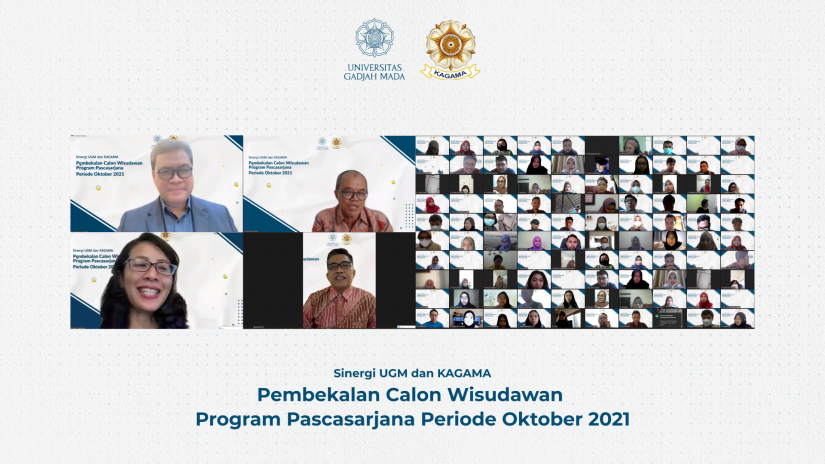
Once again, the synergy between UGM and KAGAMA was formed at the Debriefing for Prospective Graduates of Postgraduate Program Period of October 2021. The debriefing was held on Thursday (14/10) through the Zoom Meeting Room and broadcasted on YouTube. Approximately 1,000 participants attended the event.
Today’s speakers were Dr. Raditya Jati, S.Si., M.Sc., Deputy for Systems and Strategy of BNPB and Ir. Budi Basuki, M.M., COO Power & Mining MedcoEnergi. The webinar was moderated by Wirastuti Widyatmanti, S.Si., Ph.D.
“UGM was established to create future leaders who will develop the nation, gain global competitiveness, and contribute to country and humanity. Therefore, UGM does not merely provide a place for education,” said Prof. Dr. Paripurna S.H., M.Hum., LL.M., Vice-rector for Cooperation and Alumni in his welcoming remarks.
The following remark was delivered by Anak Agung Gede Putra, S.I.P., M.M., Head of Division VI PP KAGAMA. He mentioned that prospective graduates will officially bear KAGAMA status, carry UGM’s identity of locally rooted globally respected, and contribute to developing the country.
Raditya Jati kicked off the presentation by explaining “Disaster Management Policies and Strategies”. He highlighted that Indonesia is located on three active tectonic plates, which then cause all cities to be prone to disasters with 12 types of disasters. In 2021, there have been 1,999 disasters in total.
Then, he also explained how a university could play a role in disaster management. One of them is to create a post-disaster analysis. Then, students could contribute to reducing disaster risk by being agents of change. First, they are in charge to encourage people’s awareness; to care and be responsive to disasters in their area. Next is social control; to control people’s behaviour which endangers the environment. The third is iron stock. It means students could assist the government in raising people’s knowledge on disaster risk. The last is to strengthen the morale and people’s awareness in expecting the climate change effects.
“As KAGAMA, I believe that understanding the risk is important as the basis for collective awareness for the community. As good citizens, we are responsible for delivering what we know to people. Also, I would emphasize to be a good person for the nation and country,” he said.
Next in line was Budi Basuki, who told the prospective graduate to perceive their work as a hobby. He stated that he also made his work in power and mining as a hobby, which assisted him to fully develop and is currently in charge as Chief Operating Officer at MedcoEnergi.
Then, he explained four needs to meet during work: physical, emotional/social, mental, and spiritual. The current working system is also different from the past. For instance, present work life is more flexible because we can work based on our skills. Meanwhile, in the past, we had many jobs based on orders, not skills.
“A successful career in the long term can be achieved if we could have fun, work wholeheartedly, gain excellent achievements amid limitations,” said Budi, who graduated from Mechanical Engineering.
Being professional means being helpful to others. In his perspective, the highest bargaining power can only be achieved by those with strength, track record, and achievements. We must have the courage to keep being helpful to those around us. He also emphasized that we must be meaningful, be yourself, be assertive, be here, and be better to reach our career peak at work.
“No matter what happens, we have to be tenacious. Never ever give up. And next is spiritual aspects, namely gratitude, patient, and sincerity,” he concluded.
This briefing is expected to motivate and inspire prospective graduates. It is not only a matter of career but other things to consider to achieve work-life balance. It is also hoped that prospective graduates can equip themselves to contribute to society.
[Alumni Relations/Article:Winona, Photo:Anas]
